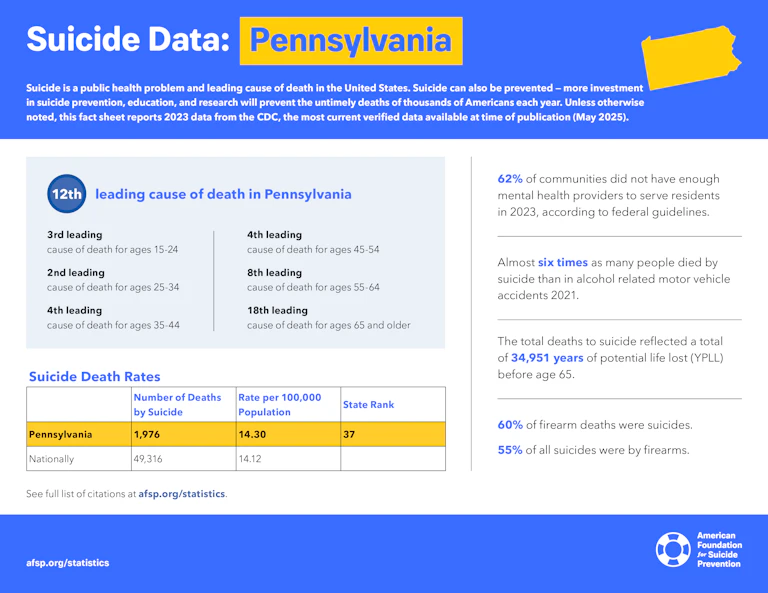Pennsylvania

Pennsylvania suicide prevention plans and initiatives
In 2017, the former Pennsylvania Youth Suicide Prevention Initiative and Adult/Older Adult Suicide Prevention Coalition were combined into Prevent Suicide PA to create a more unified vision of suicide prevention across the lifespan. In 2019, the Governor announced the new statewide Suicide Prevention Task Force, made up of multiple state agencies with policy and programmatic expertise, members of the General Assembly, and Prevent Suicide PA, within the Pennsylvania Department of Human Services (DHS). The Task Force was charged with developing Pennsylvania’s new statewide suicide prevention plan to reduce suicide in the state and fight the stigma associated with suicide, suicide attempts, and mental health issues. In September 2020, DHS published the Pennsylvania Statewide Suicide Prevention Plan for 2020-2024, which addresses suicide as a public health issue, utilizing a cross-sector approach and building off existing suicide prevention plans.
Pennsylvania laws
Key:
- Required by law
- Encouraged by law
- No law in place
Crisis lines and 988 implementation
- Addresses 988 infrastructure and provides for telecom user fee
- Addresses 988 infrastructure but does not include telecom user fee
- 988 law limited to creating an exploratory commission, advisory committee, or task force
Mental health parity
- Public health plans (e.g., Medicaid) regularly submit parity compliance analyses to state regulators
- Private health plans (individual and group) regularly submit parity compliance analyses to state regulators
K – 12 school suicide prevention
- Inclusion of the 988 Suicide & Crisis Lifeline and/or other crisis line(s) on student ID cards
- Student allowances for excused mental health absences
- School personnel must report student suicide risk to a parent and/or guardian
- Suicide prevention and/or mental health training for certain school personnel, annual
- Suicide prevention and/or mental health training for certain school personnel, not annual
- Suicide prevention, intervention, and postvention policies/programming
- Student education on suicide prevention
Health professional training in suicide assessment, treatment and management
- Mental health professionals receive regular training
- Mental health professionals receive one time training
- Medical/surgical professionals receive regular training
- Medical/surgical professionals receive one time training
Conversion therapy bans
- Prohibits licensed/board certified mental health providers from engaging in conversion therapy with minors under 18 years of age
- Prohibits licensed/board certified mental health providers from engaging in conversion therapy with vulnerable adults
- Prohibits use of state funds for any purpose related to conversion therapy (e.g., conducting, making a referral for, or extending health benefits coverage for)
University and college campus suicide prevention
- Inclusion of the 988 Suicide & Crisis Lifeline and/or other crisis line(s) on student ID cards
- Students receive information on available mental health and/or suicide prevention services and/or resources
- Adoption of suicide prevention/awareness policy or program
Firearms
- Process for extreme risk protection orders (ERPOs)
- State voluntary do not sell list